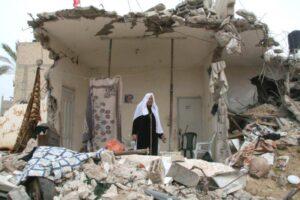Gaza Unlivable, Says UN and Our Own Eyes
This month marks 10 years since Israel (and Egypt) have essentially placed Gaza in a stranglehold, imposing a blockade that has left two million residents without sufficient food, jobs, drinking water and sanitation to live, according to a report from the United Nations.
Citing the humanitarian disaster resulting from the ongoing siege as well as devastation from bombing campaigns (in 2008-9, 2012 and 2014), the UN Report makes clear that Gaza is now uninhabitable, well before the earlier predicted time frame of 2020.
The main question is …what will the international community do in response to the relentless human rights violations and now unlivable situation in Gaza?
The report confirms what we saw and heard during our visit to Gaza earlier this year. A young mother of two toddler girls told us, “The water out of the faucet is completely brown and smells. I’m worried about the water that I’m giving to my children; I worry about what it’s doing to their growing bodies. But I can’t afford water from water trucks, and there’s no way to know even if that water is clean.”
The main question in response to the UN report is the same that has been posed by social movements in Palestine and solidarity groups worldwide: As our partner Raji Sourani of the Palestinian Center for Human Rights questions, after two decades of the “best documented ongoing human rights violations in the world,” what will the international community do in response to the relentless human rights violations and now unlivable situation in Gaza?

It is impossible to overstate the horrific situation in Gaza. More than half of the 2 million people living in Gaza face food insecurity and rely on aid for basic sustenance because of complete economic isolation. Farmers and fishers cannot access their own land and seas to produce enough food. Hundreds of thousands of children know only war, bombing and trauma without sufficient medical and mental health services. And recent electrical blackouts add to the already intense burden of hospitals, schools and families to survive.
While our Palestinian partners acknowledge that UN member states are failing Gaza, and the rest of the occupied Palestinian territories, they believe people-to-people engagement and solidarity can change the status quo. Grassroots International remains committed to supporting Palestinian human rights and livelihoods, supporting our partners there and engaging in advocacy in the US.


